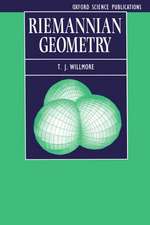Symplectic Invariants and Hamiltonian Dynamics: Birkhäuser Advanced Texts Basler Lehrbücher
Autor Helmut Hofer, Eduard Zehnderen Limba Engleză Paperback – 13 oct 2012
| Toate formatele și edițiile | Preț | Express |
|---|---|---|
| Paperback (2) | 478.71 lei 6-8 săpt. | |
| Birkhäuser Basel – 13 oct 2012 | 478.71 lei 6-8 săpt. | |
| Springer – 2 apr 2011 | 643.34 lei 6-8 săpt. |
Din seria Birkhäuser Advanced Texts Basler Lehrbücher
-
 Preț: 274.05 lei
Preț: 274.05 lei -
 Preț: 465.14 lei
Preț: 465.14 lei -
 Preț: 246.51 lei
Preț: 246.51 lei - 15%
 Preț: 787.71 lei
Preț: 787.71 lei -
 Preț: 394.51 lei
Preț: 394.51 lei -
 Preț: 400.85 lei
Preț: 400.85 lei - 19%
 Preț: 426.16 lei
Preț: 426.16 lei - 15%
 Preț: 546.13 lei
Preț: 546.13 lei -
 Preț: 377.77 lei
Preț: 377.77 lei -
 Preț: 386.61 lei
Preț: 386.61 lei -
 Preț: 515.87 lei
Preț: 515.87 lei - 15%
 Preț: 535.34 lei
Preț: 535.34 lei - 15%
 Preț: 662.16 lei
Preț: 662.16 lei - 15%
 Preț: 580.36 lei
Preț: 580.36 lei - 15%
 Preț: 612.41 lei
Preț: 612.41 lei - 20%
 Preț: 445.81 lei
Preț: 445.81 lei - 19%
 Preț: 418.88 lei
Preț: 418.88 lei -
 Preț: 420.40 lei
Preț: 420.40 lei -
 Preț: 386.22 lei
Preț: 386.22 lei -
 Preț: 518.16 lei
Preț: 518.16 lei -
 Preț: 398.53 lei
Preț: 398.53 lei -
 Preț: 393.52 lei
Preț: 393.52 lei - 15%
 Preț: 549.72 lei
Preț: 549.72 lei -
 Preț: 465.14 lei
Preț: 465.14 lei -
 Preț: 398.53 lei
Preț: 398.53 lei - 15%
 Preț: 537.79 lei
Preț: 537.79 lei - 18%
 Preț: 791.25 lei
Preț: 791.25 lei - 15%
 Preț: 480.15 lei
Preț: 480.15 lei - 15%
 Preț: 604.04 lei
Preț: 604.04 lei -
 Preț: 391.02 lei
Preț: 391.02 lei -
 Preț: 399.29 lei
Preț: 399.29 lei -
 Preț: 392.37 lei
Preț: 392.37 lei - 23%
 Preț: 613.38 lei
Preț: 613.38 lei
Preț: 478.71 lei
Preț vechi: 563.19 lei
-15% Nou
Puncte Express: 718
Preț estimativ în valută:
91.61€ • 95.29$ • 75.63£
91.61€ • 95.29$ • 75.63£
Carte tipărită la comandă
Livrare economică 14-28 aprilie
Preluare comenzi: 021 569.72.76
Specificații
ISBN-13: 9783034896719
ISBN-10: 3034896719
Pagini: 364
Ilustrații: XIII, 346 p. 2 illus.
Dimensiuni: 178 x 254 x 19 mm
Greutate: 0.63 kg
Ediția:1994
Editura: Birkhäuser Basel
Colecția Birkhäuser
Seria Birkhäuser Advanced Texts Basler Lehrbücher
Locul publicării:Basel, Switzerland
ISBN-10: 3034896719
Pagini: 364
Ilustrații: XIII, 346 p. 2 illus.
Dimensiuni: 178 x 254 x 19 mm
Greutate: 0.63 kg
Ediția:1994
Editura: Birkhäuser Basel
Colecția Birkhäuser
Seria Birkhäuser Advanced Texts Basler Lehrbücher
Locul publicării:Basel, Switzerland
Public țintă
ResearchCuprins
1 Introduction.- 1.1 Symplectic vector spaces.- 1.2 Symplectic diffeomorphisms and Hamiltonian vector fields.- 1.3 Hamiltonian vector fields and symplectic manifolds.- 1.4 Periodic orbits on energy surfaces.- 1.5 Existence of a periodic orbit on a convex energy surface.- 1.6 The problem of symplectic embeddings.- 1.7 Symplectic classification of positive definite quadratic forms.- 1.8 The orbit structure near an equilibrium, Birkhoff normal form.- 2 Symplectic capacities.- 2.1 Definition and application to embeddings.- 2.2 Rigidity of symplectic diffeomorphisms.- 3 Existence of a capacity.- 3.1 Definition of the capacity c0.- 3.2 The minimax idea.- 3.3 The analytical setting.- 3.4 The existence of a critical point.- 3.5 Examples and illustrations.- 4 Existence of closed characteristics.- 4.1 Periodic solutions on energy surfaces.- 4.2 The characteristic line bundle of a hypersurface.- 4.3 Hypersurfaces of contact type, the Weinstein conjecture.- 4.4 “Classical” Hamiltonian systems.- 4.5 The torus and Herman’s Non-Closing Lemma.- 5 Compactly supported symplectic mappings in ?2n.- 5.1 A special metric d for a group D of Hamiltonian diffeomorphisms.- 5.2 The action spectrum of a Hamiltonian map.- 5.3 A “universal” variational principle.- 5.4 A continuous section of the action spectrum bundle.- 5.5 An inequality between the displacement energy and the capacity.- 5.6 Comparison of the metric d on D with the C0-metric.- 5.7 Fixed points and geodesics on D.- 6 The Arnold conjecture, Floer homology and symplectic homology.- 6.1 The Arnold conjecture on symplectic fixed points.- 6.2 The model case of the torus.- 6.3 Gradient-like flows on compact spaces.- 6.4 Elliptic methods and symplectic fixed points.- 6.5 Floer’s appraoch to Morse theory for the actionfunctional.- 6.6 Symplectic homology.- A.2 Action-angle coordinates, the Theorem of Arnold and Jost.- A.4 The Cauchy-Riemann operator on the sphere.- A.5 Elliptic estimates near the boundary and an application.- A.6 The generalized similarity principle.- A.7 The Brouwer degree.- A.8 Continuity property of the Alexander-Spanier cohomology.
Recenzii
From the reviews:
“Symplectic Invariants and Hamiltonian Dynamics is obviously a work of central importance in the field and is required reading for all would-be players in this game. Happily, it is very well written and sports a lot of very useful commentary by the authors; the sections introducing the individual chapters are particularly well done … . It is all fine scholarship in an exciting and fertile area.” (Michael Berg, The Mathematical Association of America, June, 2011)
“Symplectic Invariants and Hamiltonian Dynamics is obviously a work of central importance in the field and is required reading for all would-be players in this game. Happily, it is very well written and sports a lot of very useful commentary by the authors; the sections introducing the individual chapters are particularly well done … . It is all fine scholarship in an exciting and fertile area.” (Michael Berg, The Mathematical Association of America, June, 2011)
Notă biografică
Helmut Hofer is Professor at the Institute for Advanced Study in Princeton, New Jersey, USA.
Eduard Zehnder is emeritus Professor of ETH Zürich, Switzerland.
Eduard Zehnder is emeritus Professor of ETH Zürich, Switzerland.
Textul de pe ultima copertă
The discoveries of the last decades have opened new perspectives for the old field of Hamiltonian systems and led to the creation of a new field: symplectic topology. Surprising rigidity phenomena demonstrate that the nature of symplectic mappings is very different from that of volume preserving mappings. This raises new questions, many of them still unanswered. On the other hand, analysis of an old variational principle in classical mechanics has established global periodic phenomena in Hamiltonian systems. As it turns out, these seemingly different phenomena are mysteriously related. One of the links is a class of symplectic invariants, called symplectic capacities. These invariants are the main theme of this book, which includes such topics as basic symplectic geometry, symplectic capacities and rigidity, periodic orbits for Hamiltonian systems and the action principle, a bi-invariant metric on the symplectic diffeomorphism group and its geometry, symplectic fixed point theory, the Arnold conjectures and first order elliptic systems, and finally a survey on Floer homology and symplectic homology.
The exposition is self-contained and addressed to researchers and students from the graduate level onwards.
------
All the chapters have a nice introduction with the historic development of the subject and with a perfect description of the state of the art. The main ideas are brightly exposed throughout the book. (…) This book, written by two experienced researchers, will certainly fill in a gap in the theory of symplectic topology. The authors have taken part in the development of such a theory by themselves or by their collaboration with other outstanding people in the area.
(Zentralblatt MATH)
This book is a beautiful introduction to one outlook on the exciting new developments of the last ten to fifteen years in symplectic geometry, or symplectic topology, as certain aspects of the subject are lately called.(…) The authors are obvious masters of the field, and their reflections here and there throughout the book on the ambient literature and open problems are perhaps the most interesting parts of the volume.
(Matematica)
The exposition is self-contained and addressed to researchers and students from the graduate level onwards.
------
All the chapters have a nice introduction with the historic development of the subject and with a perfect description of the state of the art. The main ideas are brightly exposed throughout the book. (…) This book, written by two experienced researchers, will certainly fill in a gap in the theory of symplectic topology. The authors have taken part in the development of such a theory by themselves or by their collaboration with other outstanding people in the area.
(Zentralblatt MATH)
This book is a beautiful introduction to one outlook on the exciting new developments of the last ten to fifteen years in symplectic geometry, or symplectic topology, as certain aspects of the subject are lately called.(…) The authors are obvious masters of the field, and their reflections here and there throughout the book on the ambient literature and open problems are perhaps the most interesting parts of the volume.
(Matematica)
Caracteristici
Opened new perspectives for the old field of Hamiltonian systems and let to the creation of a new field: symplectic topology Invariants which grew out of lectures given by the authors Selection by a single principle: the action principle of mechanics Includes supplementary material: sn.pub/extras


















